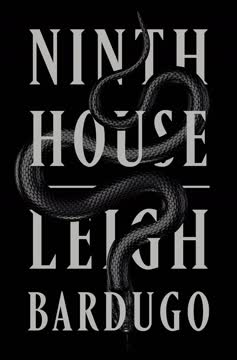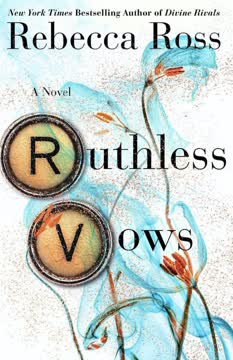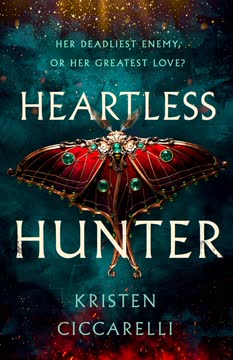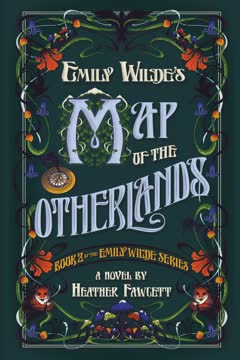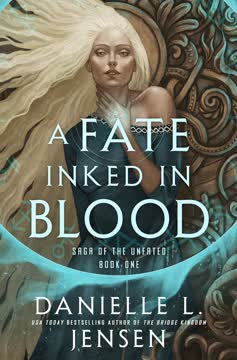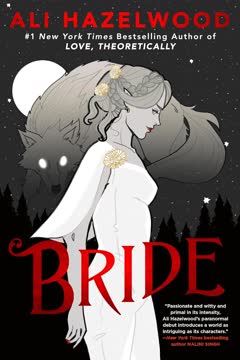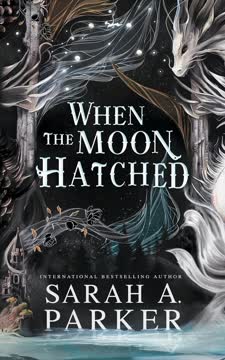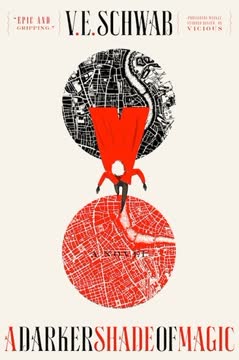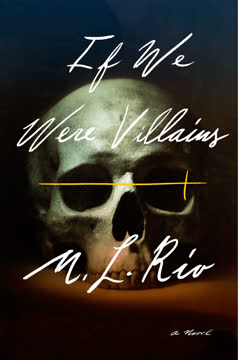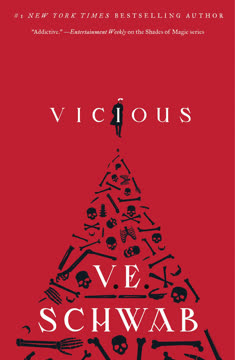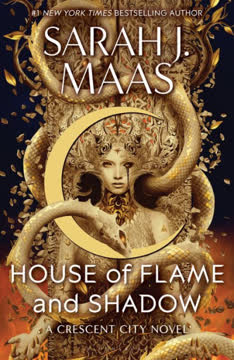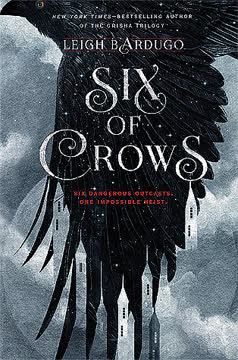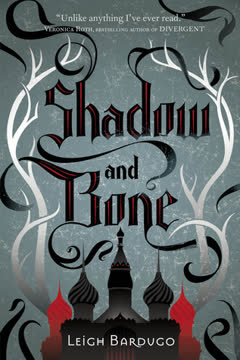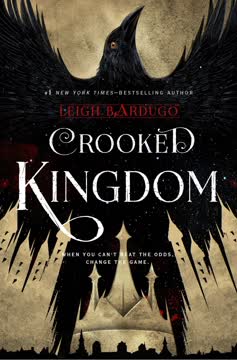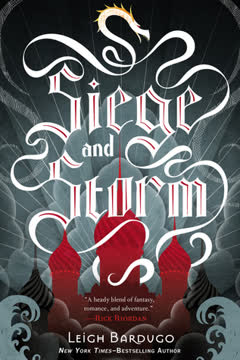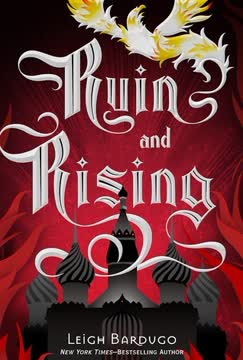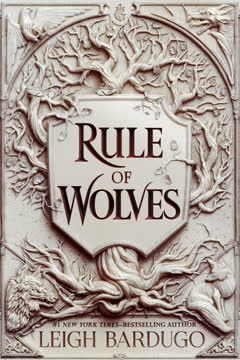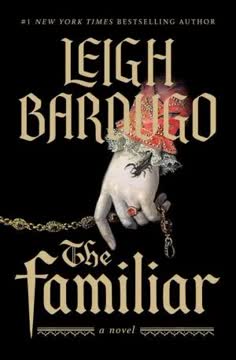Plot Summary
Blood on the Wool
Alex Stern, battered and traumatized, holes up in Lethe's secret rooms after a bloody, supernatural ordeal. She's a Yale freshman with a criminal past, recruited for her rare ability to see ghosts—"Grays"—without magical aid. As she recovers, she reflects on the Lethe House's cryptic requirements and her own unorthodox selection. The world outside is waking to spring, but Alex is haunted by the violence she's witnessed and the wounds she carries, both physical and psychic. She's alone, isolated by secrets, and the only thing keeping her tethered is the knowledge that she's now part of something ancient and dangerous.
The Shepherds' Secret
Lethe House, the Ninth House, exists to monitor Yale's secret societies—Skull and Bones, Book and Snake, Scroll and Key, and others—who wield real, often deadly, magic. Alex is Lethe's "Dante," a freshman apprentice, guided by her "Virgil," Daniel "Darlington" Arlington. Lethe's mission is to keep the societies' occult activities from harming students and townspeople, but the line between oversight and complicity is thin. The societies' rituals—prognostications, necromancy, shapeshifting—are powerful, lucrative, and protected by generations of privilege. Lethe's motto, "We are the shepherds," is both a promise and a warning: they watch the wolves, but sometimes become them.
Ghosts in the Ivy
Alex's ability to see Grays is both a blessing and a curse. She's tormented by the dead, who are drawn to life and suffering, and her power makes her an outsider even among Lethe's magical elite. Her mentor, Darlington, is both fascinated and frustrated by her raw talent and her refusal to play by Yale's rules. Their relationship is fraught—teacher and student, adversaries and allies, each with secrets. Alex's past—addiction, trauma, violence—shadows her present, and her struggle to fit in at Yale is mirrored by her struggle to control her power and survive Lethe's dangerous world.
The Chosen and the Damned
When a local girl, Tara Hutchins, is found brutally murdered near campus, Alex is drawn into the investigation. The societies' rituals are always risky, but this death feels different—personal, messy, and possibly connected to forbidden magic. The police, led by Detective Turner (Lethe's "Centurion"), are quick to blame Tara's boyfriend, but Alex suspects a deeper, more sinister link to the societies. As she investigates, she's stonewalled by Lethe's leadership, who fear scandal and loss of funding more than justice. The murder becomes a test: of Lethe's purpose, of Alex's loyalty, and of the true cost of magic.
Rituals and Revelations
Alex's education in Lethe is a crash course in the occult: she witnesses a Bonesman ritual where a living man's entrails are read for stock tips, and she learns the rules of protection—bone dust, graveyard dirt, death words. But the societies' magic is unpredictable, and the dead are restless. During a ritual gone wrong, Alex's power saves lives but exposes her to new dangers. She's forced to confront the reality that magic is not just a tool, but a force that warps everyone who touches it. The societies' secrets are built on blood, and Lethe's oversight is more performance than protection.
The Price of Power
As Alex digs deeper into Tara's murder, she uncovers a web of deals, betrayals, and magical debts. The societies' members—rich, powerful, and reckless—treat magic as their birthright, and Lethe as their janitor. Alex's own survival depends on bargains: with Dawes, Lethe's research assistant; with Turner, the skeptical cop; with the dead themselves. She learns to use compulsion coins, to manipulate rituals, to fight monsters both human and supernatural. But every favor has a price, and every secret is a weapon. The more Alex learns, the more she realizes that Lethe's shepherds are as compromised as the wolves they watch.
The Dead Girl's Map
Alex discovers that Tara's murder is not an isolated tragedy, but part of a century-old pattern: every time a new society tomb is built, a girl dies, her soul consumed to create a magical nexus. The city's power is built on the bodies of the forgotten—immigrant girls, poor girls, girls like Alex. Darlington, before his disappearance, was close to exposing this truth. The societies' magic, their wealth and influence, are all rooted in ritual murder. Lethe's mission is revealed as a sham: they are not protectors, but enablers, complicit in the city's cycle of violence.
The Monster in the Veil
Darlington, Alex's mentor, vanishes during a botched ritual, consumed by a hellbeast summoned in the societies' underbelly. Lethe's leadership claims he's "abroad," but Alex knows the truth: he's been devoured, body and soul, by the magic he tried to police. His absence leaves Alex vulnerable, both to the societies' machinations and to the monsters that now stalk her. The line between the living and the dead blurs, and Alex is forced to rely on her own wits, her haunted allies, and the dangerous power within her. The cost of oversight is not just moral compromise, but annihilation.
Lethe's Bargain
With Darlington gone and Lethe in chaos, Alex forges uneasy partnerships: with Dawes, who becomes her confidante and co-conspirator; with Turner, who is drawn deeper into the world of magic; and with the Bridegroom, a notorious Gray with his own agenda. Alex learns to let the dead inside her, to wield their strength, but at the risk of losing herself. She uncovers the truth about Tara's murder: it was orchestrated by Dean Sandow, Lethe's own leader, to create a new nexus for a society's tomb—and to cover up the city's bloody history. The shepherds have become the wolves.
The Cost of Survival
Alex and Dawes survive an attack by Blake Keely, a privileged student who used magical drugs to assault women and, under Sandow's compulsion, to kill Tara. The societies close ranks, covering up the crimes with money and influence. Lethe's board offers Alex a deal: her silence and complicity in exchange for protection, a passing GPA, and a place at Yale. The cycle of violence continues, and the city's magic remains undisturbed. Alex is left to reckon with the knowledge that justice is reserved for the powerful, and that survival often means becoming what you hate.
The Wheelwalker's Hunger
The true monster behind the city's magic is not a man, but a woman: Professor Belbalm, beloved head of college, is revealed as Daisy Fanning Whitlock, the first victim and first predator. She is a "Wheelwalker," a soul-eater who has possessed body after body for over a century, consuming the souls of gifted girls to sustain her immortality and create the nexuses the societies depend on. She is the city's secret engine, the architect of its power and its suffering. Alex, herself a Wheelwalker, is her intended next meal.
The Gentleman Demon
In the aftermath of Sandow's and Belbalm's deaths, Alex realizes that Darlington, devoured by the hellbeast, has not died but been transformed into a demon—a "gentleman demon," feared even by the monsters of the Veil. His fate is a warning: the city's magic does not just consume the innocent, but corrupts its guardians. Alex, Dawes, and Michelle Alameddine resolve to rescue him from hell, but the cost may be more than any of them can bear.
The House Always Wins
Despite the revelations, the societies endure. Lethe's board covers up the murders, the magical abuses, and the true nature of the city's power. The guilty are protected, the innocent are forgotten, and the cycle of sacrifice continues. Alex is offered a place at Yale, a passing grade, and a summer job in exchange for her silence. The city's magic, built on blood and lies, remains undisturbed. The house always wins.
The Rattler's Choice
Refusing to be a victim or a pawn, Alex embraces her identity as a survivor—a "rattler," dangerous and unafraid. She rejects Lethe's bargains, exposes Sandow's crimes, and confronts Belbalm in a final, supernatural battle. Drawing on the strength of the dead, she breaks the cycle of predation, freeing the souls Belbalm consumed and ending her reign. But the cost is high: Alex is left haunted, changed, and more alone than ever.
The End of Innocence
The events at Yale have stripped Alex of any illusions about magic, power, or justice. She sees the societies, Lethe, and the city itself for what they are: machines that grind up the vulnerable to feed the privileged. The dead are unquiet, the living are complicit, and the only way to survive is to fight. Alex is no longer content to be a shepherd. She is ready to become a wolf.
The Reckoning at Black Elm
The attempt to rescue Darlington from hell ends in disaster, revealing the limits of Lethe's power and the depth of the city's corruption. Dawes and Alex, battered but unbroken, resolve to try again, to challenge the system that has consumed so many. The reckoning is not over; the real battle is just beginning.
The Unquiet Dead
The ghosts of New Haven—literal and figurative—continue to haunt Alex. The city's history of violence, exploitation, and sacrifice is not easily exorcised. The dead demand justice, and Alex is left to decide whether she will answer their call or become another cog in the machine.
Hell Awaits
As spring comes to New Haven, Alex, Dawes, and Michelle prepare to descend into hell to rescue Darlington. The city's magic is still hungry, the societies are still powerful, and the dead are still restless. But Alex is no longer afraid. She is ready to face the darkness, to fight for the living and the dead, and to claim her place in a world that would rather see her silenced.
Characters
Alex Stern (Galaxy Stern)
Alex is a young woman marked by trauma, addiction, and violence, but also by a rare magical gift: she can see and interact with the dead without aid. Her past—abuse, loss, and a massacre she survived by letting a ghost possess her—makes her both vulnerable and dangerous. At Yale, she is an outsider among outsiders, chosen for Lethe because of her power, not her pedigree. Alex is fiercely intelligent, stubborn, and unwilling to accept the world's injustices, even as she is forced to compromise to survive. Her journey is one of self-acceptance, as she learns to wield her power, confront her past, and challenge the corrupt systems around her. She is both a victim and a predator, a shepherd and a wolf, and her greatest fear is becoming the very monster she fights.
Daniel "Darlington" Arlington
Darlington is Lethe's "Virgil," a brilliant, privileged, and deeply principled young man who loves magic, Yale, and the city of New Haven. Raised in a crumbling mansion, he is both a scholar and a romantic, determined to do good in a world that rewards compromise. His relationship with Alex is complex—teacher, protector, sometimes adversary. Darlington's disappearance and transformation into a demon is the novel's central tragedy: he is consumed by the very magic he sought to police, a warning about the cost of idealism in a corrupt system. His fate haunts Alex and drives the quest for redemption.
Pamela Dawes
Dawes is Lethe's research assistant ("Oculus"), a grad student more comfortable with books than people. She is awkward, introverted, and often overlooked, but her knowledge and quiet courage make her indispensable. Dawes becomes Alex's closest friend and confidante, helping her navigate Lethe's dangers and ultimately standing with her against the society's leadership. Her development from timid assistant to active participant mirrors Alex's own journey from outsider to leader.
Dean Elliot Sandow
Sandow is the dean of Lethe and the embodiment of institutional rot. Outwardly a kindly academic, he is in fact a manipulator who orchestrates Tara's murder to create a new magical nexus and covers up the city's history of ritual sacrifice. His willingness to sacrifice the vulnerable for his own gain—and to use Lethe's power to protect himself—makes him the novel's most chilling human antagonist. His downfall is both a victory and a warning: the system protects itself, and there is always another Sandow waiting in the wings.
The Bridegroom (Bertram Boyce North)
North is a famous Gray, a murder victim from the 19th century whose story is entwined with the city's magical history. He becomes Alex's uneasy ally, helping her investigate Tara's murder and the pattern of ritual sacrifice. His own tragedy—possessed, forced to kill his beloved, and then doomed to wander—mirrors the city's cycle of violence. His relationship with Alex is fraught: he is both a helper and a potential threat, a reminder that the dead are never truly at rest.
Professor Marguerite Belbalm (Daisy Fanning Whitlock)
Belbalm is the novel's ultimate monster: a "Wheelwalker," a soul-eater who has possessed body after body for over a century, consuming the souls of gifted girls to sustain her immortality and create the magical nexuses the societies depend on. She is charming, beloved, and utterly ruthless, the city's secret engine of power and suffering. Her confrontation with Alex is the climax of the novel, a battle between predator and survivor, and her defeat is both a victory and a warning about the cost of unchecked power.
Detective Abel Turner
Turner is Lethe's police liaison ("Centurion"), a Black detective who distrusts both the societies and Lethe's privileged students. He is ambitious, sharp, and deeply moral, but forced to compromise to protect his family. His partnership with Alex is uneasy but essential: he grounds her investigation in the real world and is ultimately one of the few adults willing to do the right thing, even at personal cost.
Blake Keely
Blake is a wealthy, popular student who uses magical drugs to assault women and, under Sandow's compulsion, to kill Tara. He is the embodiment of the societies' worst excesses: entitled, violent, and protected by money and influence. His downfall is a rare moment of justice, but it comes at great cost.
Tara Hutchins
Tara is a local girl whose murder sets the plot in motion. She is both a victim of the societies' predations and a participant in their world, dealing drugs and seeking power. Her death is not just a tragedy, but a revelation: she is the latest in a long line of girls sacrificed to feed the city's magic. Her story is a warning about the cost of ambition and the vulnerability of the powerless.
Mercy Zhao
Mercy is Alex's roommate and one of her few true friends at Yale. She represents the life Alex might have had—safe, ordinary, full of possibility. Her own victimization by magical abuse is a reminder that no one is truly safe in the societies' world, and her loyalty to Alex is a rare source of comfort and hope.
Plot Devices
Dual Timelines and Interwoven Mysteries
The novel unfolds in two main timelines—"Last Fall" and "Winter/Spring"—with frequent flashbacks to Alex's traumatic past. This structure allows the reader to piece together the mysteries of Tara's murder, Darlington's disappearance, and the city's magical history alongside Alex. The interwoven timelines create suspense, reveal character motivations, and highlight the cyclical nature of violence and power in New Haven.
Magical Realism and Occult Rituals
The societies' rituals—prognostication, necromancy, shapeshifting, portal magic—are described in vivid, often gruesome detail. Magic is not just a tool, but a corrupting force that warps everyone who touches it. The rules of protection (bone dust, graveyard dirt, death words) and the dangers of the Veil (ghosts, glumae, hellbeasts) create a sense of constant threat. Magic is also a metaphor for privilege, power, and the ways institutions protect themselves at the expense of the vulnerable.
Possession and Identity
Alex's ability to let ghosts possess her—first Hellie, then North—raises questions about agency, trauma, and survival. The ultimate predator, Belbalm, is a soul-eater who has built her immortality on consuming others. The motif of possession is both literal and symbolic: the powerful consume the powerless, and survival often means becoming what you hate.
Institutional Complicity and Moral Ambiguity
The societies' crimes are covered up, their power protected by money, tradition, and bureaucracy. Lethe's leadership is more concerned with funding and reputation than justice. The novel uses foreshadowing and irony to expose the gap between Lethe's stated mission and its actual behavior. The "shepherds" are as compromised as the wolves they watch.
The Unquiet Dead and the Cost of Secrets
The ghosts of New Haven—literal and figurative—haunt the present, demanding justice and threatening to expose the city's secrets. The pattern of ritual sacrifice, the cycle of violence, and the hunger of the city's magic are all revealed through the dead's stories. The novel uses supernatural horror to explore the real-world costs of silence, complicity, and institutional rot.
Analysis
Ninth House is a dark, unflinching exploration of power, privilege, and survival, set in a world where magic is real, dangerous, and reserved for the elite. Leigh Bardugo uses the occult trappings of Yale's secret societies to expose the ways institutions protect themselves by sacrificing the vulnerable—especially women, the poor, and outsiders. The novel's protagonist, Alex Stern, is both a victim and a predator, forced to compromise, bargain, and fight to survive in a system rigged against her. The story's central mysteries—Tara's murder, Darlington's disappearance, the city's cycle of sacrifice—are ultimately revealed as symptoms of a deeper rot: a society built on blood, lies, and the consumption of the powerless by the powerful. Bardugo refuses easy answers or happy endings; justice is partial, the guilty are protected, and the cycle of violence continues. Yet the novel also offers hope: in Alex's refusal to be silenced, in her alliances with Dawes and Turner, and in the promise of a new reckoning. Ninth House is a warning and a call to arms: the dead are unquiet, the living are complicit, and the only way to survive is to fight—for yourself, for the forgotten, and for a world that might one day be different.
Last updated:
FAQ
Synopsis & Basic Details
What is Ninth House about?
- Yale's Dark Underbelly: Ninth House introduces Alex Stern, a freshman at Yale University with a unique and terrifying ability: she can see ghosts, known as Grays. Recruited by Lethe House, the secret society overseeing Yale's other eight occult societies, Alex is tasked with monitoring their dangerous magical rituals and keeping the peace between the living and the dead.
- Murder and Mystery: The narrative follows Alex as she navigates her new life at Yale, haunted by her past and the Grays that constantly surround her. When a local townie girl is brutally murdered, Alex is drawn into a complex investigation that uncovers a sinister pattern of ritual sacrifice, institutional corruption, and a hidden history of magic built on the lives of the vulnerable.
- Survival and Self-Discovery: As Alex delves deeper, she uncovers secrets about her mentor, Darlington, her own powers, and the true nature of the magical world she inhabits. The story is a gritty blend of dark academia, urban fantasy, and psychological thriller, exploring themes of privilege, trauma, and the fight for survival against overwhelming odds.
Why should I read Ninth House?
- Unique Dark Academia: Ninth House offers a fresh, gritty take on the dark academia genre, blending the prestige of Yale with a visceral, dangerous magic system. It subverts traditional tropes by focusing on the marginalized and traumatized, making it a compelling read for those seeking a darker, more mature fantasy.
- Complex Protagonist Analysis: Alex Stern is a deeply flawed yet fiercely resilient protagonist whose journey of self-discovery and empowerment is both raw and inspiring. Readers will be drawn to her sharp wit, her struggle with trauma, and her unwavering determination to fight for justice in a world that would rather silence her.
- Rich World-Building & Social Commentary: Leigh Bardugo crafts a meticulously detailed magical New Haven, where ancient occult societies mirror real-world power structures and privilege. The novel offers incisive social commentary on class, gender, and institutional corruption, wrapped in a thrilling mystery that keeps readers guessing until the very end.
What is the background of Ninth House?
- Yale's Occult History: The novel is set against the backdrop of a fictionalized Yale University, where its famous secret societies (like Skull and Bones, Scroll and Key) are not just social clubs but wielders of real, dangerous magic. These societies perform rituals for power, wealth, and influence, from prognostication (reading entrails for stock tips) to necromancy and portal magic.
- New Haven's Magical Nexus: New Haven itself is depicted as a unique nexus of magical power, a place where the Veil between worlds is thin, drawing both powerful practitioners and restless spirits. This inherent magical energy is what allows the societies' rituals to function, and it's deeply intertwined with the city's history, architecture, and even its economic struggles.
- Lethe House's Oversight: Lethe House, the "Ninth House," was founded in 1898 as an oversight body to monitor the Ancient Eight societies, ensuring their magic doesn't harm students or townspeople. Funded by the societies themselves, Lethe's mission is fraught with moral compromises, as its delegates ("Dante" and "Virgil") are often forced to balance justice with the preservation of the powerful institutions they police.
What are the most memorable quotes in Ninth House?
- "Mors irrumat omnia. Death fucks us all.": This chilling Latin phrase, a corrupted version of "Death conquers all," appears in the prologue and becomes a recurring motif. It encapsulates the novel's grim outlook on mortality and the pervasive, often brutal, nature of death and magic, highlighting Alex's cynical yet realistic view of the world.
- "We are the shepherds. We walked 'cross the mountains. We left our flocks when the new star appeared.": Quoted by Alex from a Johnny Cash song, this line ironically contrasts with Lethe's official motto, "We Are the Shepherds." It underscores the hypocrisy and abandonment inherent in Lethe's mission, revealing how the supposed protectors often fail or betray those they are meant to guard.
- "There are worse things than death, Miss Stern.": Spoken by the Bridegroom, Bertram Boyce North, this quote hints at the profound and often terrifying consequences of magic that extend beyond mere physical demise. It foreshadows the existence of soul-eating Wheelwalkers and the ultimate fate of Darlington, emphasizing the novel's exploration of spiritual annihilation and the unquiet dead.
What writing style, narrative choices, and literary techniques does Leigh Bardugo use?
- Dual Timeline Narrative: Bardugo employs a non-linear narrative, alternating between "Last Fall" (Darlington's mentorship of Alex) and "Winter/Early Spring" (Alex's solo investigation of Tara's murder). This dual timeline effectively builds suspense, gradually revealing the backstory of Darlington's disappearance while simultaneously driving the present-day mystery, enriching the reader's understanding of character motivations and the unfolding plot.
- Gothic Atmosphere & Social Realism: The novel masterfully blends gothic elements—crumbling mansions, restless ghosts, ancient secrets, and a pervasive sense of dread—with stark social realism. Bardugo grounds the fantastical elements in the harsh realities of class disparity, trauma, and institutional power, creating a unique tone that is both magically immersive and socially incisive.
- Unreliable Narration & Subtext: Alex Stern's perspective is often colored by her trauma, drug use, and outsider status, making her a subtly unreliable narrator. Bardugo uses dialogue subtext, environmental descriptions, and character reactions that contradict words to hint at deeper truths and hidden agendas, forcing the reader to actively interpret events and question appearances, especially regarding the motivations of characters like Sandow and Belbalm.
Hidden Details & Subtle Connections
What are some minor details that add significant meaning?
- The Hutch's Scent: The secret rooms above the clothing store, known as the Hutch, are enchanted to "smell always of fabric softener and clove." This seemingly minor detail provides a stark contrast to Alex's often grim reality, offering a fleeting sense of domestic comfort and safety within Lethe's dangerous world, a subtle hint of the protection the house offers, even if Alex initially struggles to accept it.
- Darlington's Profanity Rule: Darlington's declaration that he "class[es] profanity with declarations of love. Best used sparingly and only when wholeheartedly m-m-meant" (Chapter 6) reveals his deeply ingrained sense of propriety and emotional restraint. This detail highlights his aristocratic upbringing and contrasts sharply with Alex's raw, unfiltered language, underscoring their initial personality clash and the different worlds they come from.
- The "First" Carriage Catalog: Darlington's note "the first?" in the margin of an old carriage catalog (Chapter 29) is a crucial, easily missed clue. It refers to the first land deed acquired by the Russell Trust (Skull and Bones) in 1854, connecting the North-Whitlock murder to the founding of the societies and the pattern of ritual sacrifice, a detail Alex later uses to unravel the entire mystery.
What are some subtle foreshadowing and callbacks?
- Beinecke Library as a "Tomb": In Chapter 1, Alex describes the Beinecke Library as looking "like a tomb" at night. This foreshadows its later use as a site for Aurelian's rituals and its symbolic role as a repository of hidden, often deadly, knowledge, reinforcing the idea that Yale's grand structures often conceal darker purposes.
- "This Town" as a Recurring Lament: Darlington's grandfather's frequent refrain, "This town," (Chapter 13) is echoed by Darlington himself, hinting at New Haven's unique, almost cursed, magical nature. This callback subtly reinforces the idea that the city's magical undercurrents are deeply ingrained in its identity and history, affecting generations of its inhabitants and the societies within it.
- Alex's "Rattler" Identity: Hellie's observation that Alex has "a little viper lurking in there, ready to strike. A rattler probably" (Chapter 9) foreshadows Alex's eventual embrace of her own dangerous, predatory nature. This callback highlights her transformation from a passive survivor to an active agent, willing to use her power aggressively to achieve justice, as seen in her confrontations with Salome and Sandow.
What are some unexpected character connections?
- Jean Gatdula, the Pervasive Nurse: Jean Gatdula, the nurse paid by Skull and Bones to care for Michael Reyes during prognostications (Chapter 1), later appears as Alex's nurse in the hospital after the attack at Il Bastone (Chapter 27). This subtle connection highlights the pervasive reach of the societies' influence, showing how even seemingly ordinary individuals are entangled in their magical network, and how Lethe's oversight is often compromised.
- Colin Khatri's Dual Role: Colin Khatri, Professor Belbalm's seemingly innocuous assistant and a member of Scroll and Key, is revealed to be deeply involved with Tara Hutchins in growing and distributing Merity (Chapter 24). This connection is unexpected because of his polished demeanor, exposing the hypocrisy within the societies and the willingness of even "bright" students to engage in dangerous, illicit magical activities for personal or societal gain.
- The Bridegroom's Link to Darlington: Bertram Boyce North, the Bridegroom, reveals that Darlington was investigating his 19th-century murder-suicide case (Chapter 12). This unexpected link shows Darlington's deep commitment to uncovering New Haven's hidden magical history, even beyond Lethe's immediate concerns, and provides Alex with a personal motivation to continue his unfinished work, deepening her understanding of his character.
Psychological, Emotional, & Relational Analysis
What are some unspoken motivations of the characters?
- Sandow's Financial Desperation: Dean Sandow's seemingly benevolent leadership is subtly undermined by his unspoken financial woes, stemming from a costly divorce (Chapter 22). This desperation is a key motivator for his decision to orchestrate Tara's murder, as he seeks to secure funding from St. Elmo's by promising a new nexus, revealing the corrupting influence of money even on those meant to uphold order.
- Dawes's Need for Belonging: Pamela Dawes's intense loyalty to Lethe and Darlington, often expressed through her meticulous work and quiet devotion, stems from a deep-seated need for belonging and purpose. As an introverted academic, Lethe provides her with a structured world where her intelligence is valued, making her fear of its dissolution (Chapter 9, 22) a powerful, unspoken driver of her actions and her eventual alliance with Alex.
- Alex's Pursuit of "Normalcy": Beneath Alex's tough exterior and desire for survival lies a profound longing for a "normal life" (Chapter 3, 5). Her initial acceptance of Yale and Lethe is driven by the promise of a clean slate, a chance to escape her traumatic past. This unspoken motivation explains her initial reluctance to fully embrace her powers and her desire to fit in, even as the magical world constantly pulls her back into chaos.
What psychological complexities do the characters exhibit?
- Alex's Trauma and Self-Loathing: Alex grapples with profound psychological trauma from her past, including the Ground Zero massacre and a childhood sexual assault by a Gray. This manifests as self-loathing ("I'm messy and Lethe is messy," Chapter 8), a tendency to self-sabotage, and a constant battle against her own perceived "craziness." Her journey is a complex process of integrating her past, accepting her power, and finding a new, albeit dangerous, sense of self.
- Darlington's Idealism vs. Reality: Darlington embodies the psychological conflict between an idealized vision of magic and the grim reality of its practice. His "knight" persona and love for Yale's history clash with the brutal truths of the societies' rituals and Lethe's compromises. His eventual transformation into a demon (Chapter 26) is a tragic culmination of this internal struggle, as his idealism is consumed by the very darkness he sought to understand and control.
- Belbalm's Twisted Justification: Professor Belbalm, revealed as the immortal soul-eater Daisy, presents a complex psychological portrait of a predator who rationalizes her horrific acts as a form of empowerment. Her claim that "Calamity comes too easily to women. Our lives can come apart in a single gesture, a rogue wave" (Chapter 5) reveals a twisted feminist justification for her soul-eating, highlighting how trauma and a desire for control can warp morality into something monstrous.
What are the major emotional turning points?
- Alex's Rage Unleashed at Aurelian: During the Aurelian ritual, when Grays breach the circle due to Alex's error, her suppressed rage erupts. Instead of fear, she feels fury, smashing expensive china at Il Bastone (Chapter 6). This moment is a significant emotional turning point, marking her shift from passive victim to active, albeit destructive, participant, acknowledging her own capacity for violence and defiance.
- Dawes's Defense of Alex to Sandow: When Dean Sandow attempts to blame Alex for the gluma attack, Dawes unexpectedly defends her, accusing the dean of "victim blaming" (Chapter 9). This is a powerful emotional turning point for Dawes, demonstrating her growing loyalty and courage, and signaling her transition from a timid research assistant to a fierce ally willing to challenge authority for Alex's sake.
- Alex's Acceptance of Her "Rattler" Identity: After the gluma attack and Sandow's dismissal, Alex consciously embraces her "rattler" identity, shedding the pretense of being a "good girl" (Chapter 9). This emotional turning point signifies her acceptance of her own dark, dangerous nature and her decision to fight the system on her own terms, using her instincts and power rather than conforming to Lethe's rules.
How do relationship dynamics evolve?
- Alex and Dawes: From Awkward Colleagues to Deep Allies: Initially, Alex and Dawes share an awkward, distant relationship, with Dawes often disapproving of Alex's methods. However, through shared trauma (the gluma attack, Blake's assault) and mutual reliance, their dynamic evolves into a deep, trusting alliance. Dawes becomes Alex's steadfast confidante and co-conspirator, their bond forged in the crucible of shared danger and a common purpose to seek justice.
- Alex and Turner: Adversarial Respect to Reluctant Partnership: Detective Turner initially views Alex with suspicion and disdain, seeing her as an entitled, unstable student. Their interactions are marked by antagonism and power plays. However, as Alex provides undeniable evidence of magic and corruption, Turner's skepticism gives way to a reluctant respect, leading to an uneasy but essential partnership where they leverage each other's strengths to investigate the murder, blurring the lines between law enforcement and the occult.
- Alex and Darlington: Complex Mentorship to Tragic Legacy: Darlington begins as Alex's idealistic, somewhat condescending mentor, guiding her through Lethe's rules. Their relationship is a mix of frustration, admiration, and unspoken attraction. His disappearance and transformation into a demon leave Alex with a profound sense of guilt and a fierce determination to rescue him. This dynamic evolves into a tragic legacy, with Alex carrying on his unfinished work and fighting for his redemption, even as he becomes something monstrous.
Interpretation & Debate
Which parts of the story remain ambiguous or open-ended?
- The Full Extent of Lethe's Complicity: While Dean Sandow's corruption is exposed, the novel leaves ambiguous how many other Lethe leaders or alumni were aware of the nexus-creation ritual or the broader pattern of ritual sacrifice. The board's quick cover-up suggests a systemic complicity that extends beyond one individual, leaving readers to debate the true depth of Lethe's moral rot and its future role.
- The Nature and Origin of Wheelwalkers: The concept of Wheelwalkers, soul-eaters like Belbalm and Alex, is introduced but their ultimate origin and the full scope of their powers remain somewhat mysterious. The novel hints at a deeper, ancient connection to New Haven's magic ("This town. Did New Haven draw Wheelwalkers here?"), but doesn't fully explain their genesis, leaving room for future exploration and reader speculation on Alex's own evolving nature.
- Darlington's Demonic Transformation: Darlington's fate as a "gentleman demon" is a significant open-ended element. The exact nature of his transformation, his consciousness, and his potential for redemption or further corruption are left for future installments. His return from hell is a central quest, but the implications of his new form for his character and his relationship with Alex are ripe for interpretive debate.
What are some debatable, controversial scenes or moments in Ninth House?
- Alex's Actions at Ground Zero: The massacre at Ground Zero, where Alex, possessed by Hellie, brutally murders Len, Betcha, and Ariel, is highly controversial. While presented as an act of self-defense and revenge against abusers, readers may debate the moral implications of her actions, questioning whether it was justified violence or a descent into cold-blooded murder, especially given her later lack of remorse.
- Belbalm's "Feminist Manifesto" Justification: Professor Belbalm's rationalization of her soul-eating as a necessary act of survival and power for women in a patriarchal world ("Calamity comes too easily to women... So I forged a new one," Chapter 31) is a deeply debatable moment. While Alex rejects it, the argument forces readers to confront the complexities of power, victimhood, and the lengths to which individuals might go to reclaim agency in oppressive systems.
- Alex's Manipulation of Tripp and Turner: Alex's calculated manipulation of Tripp Helmuth (Chapter 12) and Detective Turner (Chapter 14) to extract information raises ethical questions. She uses their vulnerabilities and prejudices to her advantage, blurring the lines between justice and personal gain. This highlights the moral ambiguity of her character and the compromises she makes to navigate a corrupt world, prompting readers to consider whether the ends justify the means.
Ninth House Ending Explained: How It Ends & What It Means
- Sandow's Exposure and Belbalm's Defeat: The climax reveals Dean Sandow as Tara's murderer, driven by financial desperation to create a new magical nexus. He is then killed by Professor Belbalm, who is unmasked as Daisy Fanning Whitlock, an immortal "Wheelwalker" who has sustained herself for over a century by consuming the souls of gifted girls to create the very nexuses the societies exploit. Alex, a nascent Wheelwalker herself, defeats Belbalm by summoning the souls of her victims, freeing them and causing Belbalm to disintegrate into dust.
- Darlington's Demonic Transformation & New Quest: The ritual to bring Darlington back from his disappearance fails, revealing that he was not merely trapped but "devoured, soul and all" by a hellbeast. However, Alex, Dawes, and Michelle Alameddine deduce that Darlington was not destroyed but transformed into a "gentleman demon." The novel concludes with them resolving to descend into hell to rescue him, setting up a new, even more perilous quest.
- Alex's Embrace of Power and Rejection of Complicity: The ending signifies Alex's full embrace of her own formidable, dangerous power as a Wheelwalker, no longer hiding or apologizing for it. She rejects Lethe's institutional complicity and the false promises of normalcy, choosing instead to actively fight against the corrupt magical system. Her journey culminates in a defiant stance against injustice, transforming her from a haunted survivor into a powerful, proactive force ready to challenge the very foundations of Yale's occult world.
Review Summary
Ninth House received mixed reviews from readers. Many praised its dark, atmospheric setting and complex characters, particularly Alex Stern. The intricate plot and Bardugo's writing style were highlights for some. However, others found the pacing slow and the content too graphic. Some struggled with the extensive world-building and felt disconnected from the characters. Despite polarizing opinions, most agreed the book was a departure from Bardugo's previous works, showcasing her ability to write adult fantasy with mature themes.
Alex Stern Series
Similar Books
Download PDF
Download EPUB
.epub digital book format is ideal for reading ebooks on phones, tablets, and e-readers.
